人教版小学四年级英语语法总结
(完整版)人教版小学英语语法知识点汇总
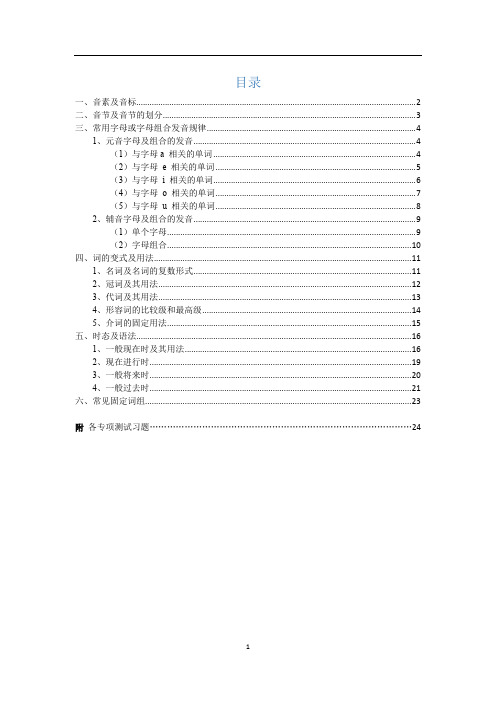
目录一、音素及音标 (2)二、音节及音节的划分 (3)三、常用字母或字母组合发音规律 (4)1、元音字母及组合的发音 (4)(1)与字母a 相关的单词 (4)(2)与字母 e 相关的单词 (5)(3)与字母i 相关的单词 (6)(4)与字母o 相关的单词 (7)(5)与字母u 相关的单词 (8)2、辅音字母及组合的发音 (9)(1)单个字母 (9)(2)字母组合 (10)四、词的变式及用法 (11)1、名词及名词的复数形式 (11)2、冠词及其用法 (12)3、代词及其用法 (13)4、形容词的比较级和最高级 (14)5、介词的固定用法 (15)五、时态及语法 (16)1、一般现在时及其用法 (16)2、现在进行时 (19)3、一般将来时 (20)4、一般过去时 (21)六、常见固定词组 (23)附各专项测试习题 (24)一、音素及音标音素:英语把组成一个读音的最小单位叫音素。
因素分为元音和辅音(相当于语文中的韵母和声母)1、元音(韵母)1.1发音方式:靠声带发音,有声调,气流通过喉头、口腔不受阻碍。
1.2举例:元音单元音长元音[a:][ә:][i:][ɔ:][u:]短元音[Λ][ә][i][ɔ][u][æ][e]双元音[ai][ei][ɔi][iә ][eә ][uә ][au][әu]1.3元音的结构元音的常见构成有:组合方式举例1单个元音字母D o g2元音字母+元音字母S ee、s ea、m ea t、b oo k3元音字母+辅音字母T al l、pl ay1.4元音字母共有5个,分别是:a e i o u2、辅音(声母)2.1发音方式:主要是用气流与牙齿舌头等其它器官摩擦发音,气流通过喉头、口腔要受到某个部位的阻碍。
2.2举例:辅音10对清辅音[p] [t] [k] [f] [s] [∫][t∫][tr] [θ][ts]浊辅音[b] [d] [g] [v] [z] [ʒ][dʒ][dr] [ð] [dz] 3个鼻音[m] [n] [η]3个似拼音[h] [r] [l]2个半元音[w] [j]2.3辅音的结构组合方式举例1单个辅音字母D og、b ook2辅音字母+辅音字tr ee、dr aw、tea ch、sh ip 2.4辅音字母26个字母中,除去5个元音字母(a、e、i、o、u),其他字母都是辅音字母。
最新人教版小学四年级英语知识点归纳总结

最新人教版小学四年级英语知识点归纳总结一、词汇篇1. 数字(Number)- 研究基础数字, 包括0到100的数字。
- 学会读和写基础数字, 并能用它们询问和回答有关数量的问题。
2. 问候(Greetings)- 研究基本的问候用语, 如"Hello!"和"How are you?"。
- 研究如何礼貌地回答问候。
3. 日期(Date)- 研究如何询问和表达日期, 包括年、月和日。
- 学会说和写日期的常用表达。
4. 时间(Time)- 研究如何询问和表达时间, 包括小时和分钟。
- 学会用英语描述日常活动所需要的时间。
5. 颜色(Color)- 研究一些基本颜色的英文单词, 如红色、黄色和蓝色。
- 能够用英语描述物品的颜色。
6. 家庭成员(Family Members)- 研究一些常见的家庭成员的英文单词, 如爸爸、妈妈和姐姐。
- 能够用英语描述自己家庭成员的关系。
二、语法篇1. 一般现在时(Simple Present Tense)- 研究一般现在时的基本形式和用法。
- 能够用一般现在时表达日常活动和惯。
2. 祈使句(Imperative Sentences)- 研究祈使句的用法和句式。
- 能够用祈使句给出指令或建议。
3. 人称代词(Personal Pronouns)- 研究一些人称代词, 如I、you、he和she等。
- 能够用适当的人称代词替换主语。
三、听力篇1. 听力训练(Listening Practice)- 进行日常生活场景的听力训练, 如购物、问候和描述人物等。
- 听力训练能够提高对英语的理解和交流能力。
- 研究听懂简单的日常对话, 并能回答相关问题。
- 对话理解能够提高听力技巧和沟通能力。
以上是最新人教版小学四年级英语知识点的归纳总结。
通过掌握这些知识点,学生们可以建立起牢固的英语基础,提高听说读写的能力。
人教版四年级英语下册语法知识点梳理

人教版四年级英语下册语法知识点梳理本文档旨在梳理人教版四年级英语下册的语法知识点,以便帮助研究者更好地掌握语法规则和运用。
1. 一般现在时- 表示经常性或惯性的动作或状态。
- 构成:主语 + 动词原形。
例如:- I eat fruit every day.(我每天吃水果。
)- She often plays sports.(她经常做运动。
)2. 现在进行时- 表示正在进行的动作。
- 构成:主语 + be 动词的现在分词 + 其他成分。
例如:- They are watching TV now.(他们正在看电视。
)- We are playing soccer in the park.(我们正在公园踢足球。
)3. 一般过去时- 表示过去发生的动作或状态。
- 构成:主语 + 动词过去式。
例如:- She visited her grandparents yesterday.(昨天她去拜访她的祖父母。
)- They played soccer last weekend.(上周末他们踢足球。
)4. 一般将来时- 表示将来要发生的动作或状态。
- 构成:主语 + will + 动词原形。
例如:- I will go to the park tomorrow.(明天我会去公园。
)- He will study English next month.(下个月他会研究英语。
)5. 祈使句- 表示请求、命令、建议等。
- 构成:动词原形(谓语动词省略主语)。
例如:- Sit down, please.(请坐。
)- Open the window.(打开窗户。
)6. There be 句型- 表示某地存在某物或某人。
- 构成:There + be动词 + 介词短语。
例如:- There is a book on the table.(桌子上有本书。
)- There are many students in the classroom.(教室里有很多学生。
人教版四年级英语知识点总结

人教版四年级英语知识点总结一、单词。
1. 动物类。
- cat(猫)、dog(狗)、duck(鸭子)、pig(猪)、bear(熊)、elephant (大象)、monkey(猴子)、bird(鸟)、tiger(老虎)、panda(熊猫)、zoo(动物园)。
- 例如:I like dogs. They are friendly.(我喜欢狗。
它们很友好。
)2. 食物类。
- cake(蛋糕)、bread(面包)、rice(米饭)、fish(鱼)、juice(果汁)、water(水)、milk(牛奶)、egg(鸡蛋)。
- 如:I'm thirsty. I want some juice.(我渴了。
我想要一些果汁。
)3. 文具类。
- book(书)、pen(钢笔)、pencil(铅笔)、ruler(尺子)、eraser(橡皮)、crayon(蜡笔)、pencil - box(铅笔盒)。
- 例如:My pencil - box is blue.(我的铅笔盒是蓝色的。
)4. 颜色类。
- red(红色)、blue(蓝色)、green(绿色)、yellow(黄色)、black(黑色)、white(白色)、orange(橙色)、brown(棕色)。
- 如:I have a red pen.(我有一支红色的钢笔。
)5. 数字类。
- one(一)、two(二)、three(三)、four(四)、five(五)、six (六)、seven(七)、eight(八)、nine(九)、ten(十)。
- 例如:I have three pencils.(我有三支铅笔。
)二、句型。
1. 询问事物。
- What's this?(这是什么?)- What's that?(那是什么?)- 回答:It's a/an + 名词。
例如:What's this? It's a cat.(这是什么?它是一只猫。
四年级英语语法归纳

四年级英语语法归纳四年级英语语法主要包括以下几个方面的内容:1. 一般现在时:表示现在经常性、习惯性或客观真理的动作或状态。
例句:I go to school every day.(我每天去上学。
)2. 一般过去时:表示过去发生的动作或状态。
例句:He played basketball yesterday.(他昨天打篮球。
)3. 一般将来时:表示将要发生的动作或存在的状态。
例句:I will study hard for the exam.(我会为考试努力学习。
)4. 现在进行时:表示现在正在进行的动作。
例句:They are playing in the park.(他们正在公园里玩。
)5. 动词的变化形式:包括动词的三单形式、动词的过去式和动词的进行时形式。
例句:He walks to school every day.(他每天走路去上学。
)I watched a movie last night.(我昨晚看了一部电影。
)He is studying in the library.(他正在图书馆学习。
)6. 物主代词:用来表示某物或某人的所有关系。
例句:This is my book.(这是我的书。
)7. 人称代词:用来代替人的称呼。
例句:She is my sister.(她是我姐姐。
)8. 数词:用来表示数量。
例句:There are five students in the classroom.(教室里有五个学生。
)以上是四年级英语语法的主要内容,希望对你有帮助!。
人教版小学四年级上册英语知识点归纳总结
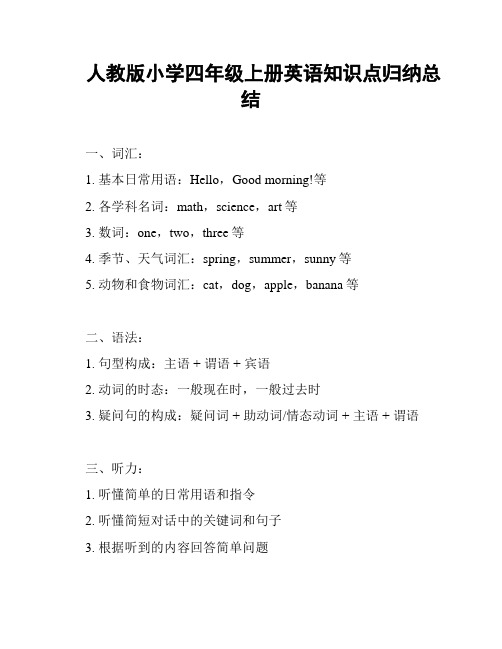
人教版小学四年级上册英语知识点归纳总
结
一、词汇:
1. 基本日常用语:Hello,Good morning!等
2. 各学科名词:math,science,art等
3. 数词:one,two,three等
4. 季节、天气词汇:spring,summer,sunny等
5. 动物和食物词汇:cat,dog,apple,banana等
二、语法:
1. 句型构成:主语 + 谓语 + 宾语
2. 动词的时态:一般现在时,一般过去时
3. 疑问句的构成:疑问词 + 助动词/情态动词 + 主语 + 谓语
三、听力:
1. 听懂简单的日常用语和指令
2. 听懂简短对话中的关键词和句子
3. 根据听到的内容回答简单问题
四、口语:
1. 能用简短的句子进行日常交流
2. 能用简单的词汇和句子进行自我介绍
3. 能用简单的语句表达自己的感受和喜好
五、阅读:
1. 能读懂简单的单词、短句和段落
2. 能根据图片或简短句子回答问题
3. 能阅读简单的故事或对话并理解基本内容
六、写作:
1. 能用简单的语句写出自己的名字、年龄和喜好
2. 能用简单的句子描述描绘短文中的内容
3. 能写出简短对话或简单的日记、便条等
以上是人教版小学四年级上册英语的知识点归纳总结,希望对您有所帮助。
人教版四年级英语重点知识归纳
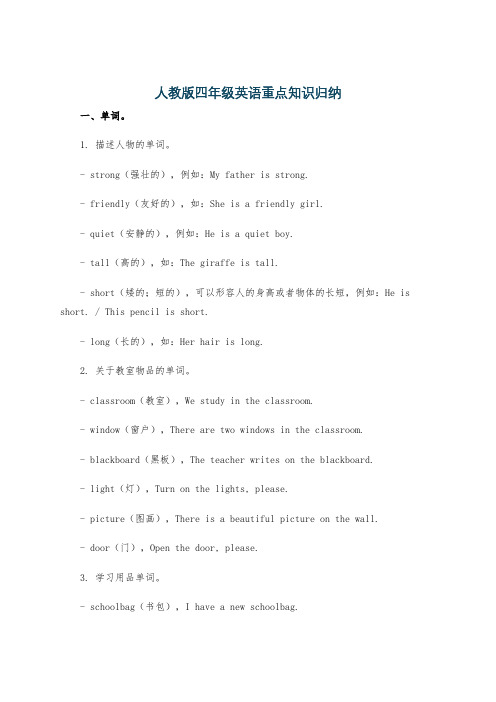
人教版四年级英语重点知识归纳一、单词。
1. 描述人物的单词。
- strong(强壮的),例如:My father is strong.- friendly(友好的),如:She is a friendly girl.- quiet(安静的),例如:He is a quiet boy.- tall(高的),如:The giraffe is tall.- short(矮的;短的),可以形容人的身高或者物体的长短,例如:He is short. / This pencil is short.- long(长的),如:Her hair is long.2. 关于教室物品的单词。
- classroom(教室),We study in the classroom.- window(窗户),There are two windows in the classroom.- blackboard(黑板),The teacher writes on the blackboard.- light(灯),Turn on the lights, please.- picture(图画),There is a beautiful picture on the wall.- door(门),Open the door, please.3. 学习用品单词。
- schoolbag(书包),I have a new schoolbag.- book(书),There are many books in my schoolbag. - pen(钢笔),I write with a pen.- pencil(铅笔),Use your pencil to draw a picture. - ruler(尺子),Measure the length with a ruler.- eraser(橡皮),Erase the mistake with an eraser.二、句型。
人教版四年级英语上册语法

人教版四年级英语上册语法
人教版四年级英语上册的语法点主要包括以下内容:
1. 名词:学生需要掌握可数名词和不可数名词的概念,以及名词的复数形式。
2. 动词:基本动词如“run”,“jump”,“play”等,以及动词的现在分词形式。
3. 形容词:一些基本的形容词,如“big”,“small”,“tall”,“short”等,以及形容词的比较级形式。
4. 介词:常用的介词如“in”,“on”,“under”,“next to”等。
5. 基本句型:如“This is ...”, “That is ...”, “There is ...”, “It has ...”等。
6. 日常对话:学生应该掌握一些基本的日常对话,如问候、自我介绍、道别等。
具体语法内容可能会因教材版本和地区不同而有差异,建议查看英语教材或咨询英语教师,以获取更准确的信息。
人教版小学四年级英语知识点
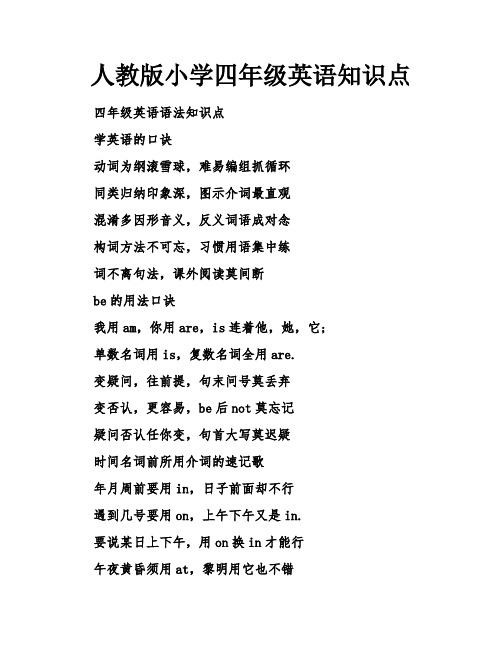
人教版小学四年级英语知识点四年级英语语法知识点学英语的口诀动词为纲滚雪球,难易编组抓循环同类归纳印象深,图示介词最直观混淆多因形音义,反义词语成对念构词方法不可忘,习惯用语集中练词不离句法,课外阅读莫间断be的用法口诀我用am,你用are,is连着他,她,它;单数名词用is,复数名词全用are.变疑问,往前提,句末问号莫丢弃变否认,更容易,be后not莫忘记疑问否认任你变,句首大写莫迟疑时间名词前所用介词的速记歌年月周前要用in,日子前面却不行遇到几号要用on,上午下午又是in.要说某日上下午,用on换in才能行午夜黄昏须用at,黎明用它也不错at也用在明分前,说差可要用上to,说过只可使用past,多说多练牢牢记,莫让岁月空蹉跎!小学四年级下册英语语法知识点:现在进行时1.现在进行时表示现在正在进行或发生的动作,也可表示当前一段时间内的活动或现阶段正在进行的动作。
2.现在进行时的肯定句根本结构为be?动词ing.3.现在进行时的否认句在be后加not。
? ???4.现在进行时的一般疑问句把be动词调到句首。
动词加ing的变化规那么? ?????1.一般情况下,直接加ing,如:cook-cooking? ????2.以不发音的e结尾,去e加ing,如:make-making,?taste-tasting? ???3.假设末尾是一个辅音字母,一个元音字母和一个辅音字母,双写末尾的辅音字母,再加ing,如:run-running,?stop-stopping? ?小学四年级英语学习方案1、能按四会与三会要求掌握所学的单词。
2、能按四会要求掌握所学的句型。
3、能运用日常交际用语,活用四会句型,进行简单的交流,并做到大胆开口,发音正确,所用话语与场合符合。
4、能在图片、手势、情景等非语言提示的帮助下听懂清晰的话语和录音。
5、培养良好的书写习惯,能做到书写标准、整洁。
6、养成良好的听英语、读英语、说英语的习惯,能自觉地模仿语音、语调,逐步培养语感。
人教版英语四年级上册重点语法总结

人教版英语四年级上册重点语法总结一、be动词的用法(am is are)1. 第一人称单数I配合am来用,句型为"I am + ..."例句:I am from Asutralia. 我来自澳大利亚。
2.第二人称You配合are来用,句型为"You are + ..."例句:You are so kind. 你真的很和蔼。
3.第三人称单数配合is来用,句型为"She/He/It is +..."例句:She is a student. 她是一个学生。
4.人称复数配合are来用,句型为"We/You/They are+..."例句:We are in Class 5. 我们来自5班。
二、疑问句汇总问东西-what(什么)问谁-who(谁)问原因-why(为什么)问谁的-whose(谁的)问选择-which(哪一个)问地点-where(在哪里)问意见-what about(怎么样)问目的-what for(为何目的)问情况-how(怎么样)问颜色-what color(什么颜色)问年龄-how old(多大)问时间-when(什么时候)问数量-how many(多少)问时间-what time(什么时间)问价钱-how much(多少钱)问具体日期-what date(什么日期)问路程-how far(多远)问星期-what day(星期几)三、五大基本句型1. 第一种句型:主谓SV主语+谓语动词I know.(我知道)2.第二种句型:主谓宾SVO主语+谓语+宾语She helped me. (她帮助了我)3.第三种句型:主谓宾宾SVOO主语+谓语+间接宾语 +直接宾语He gave me a book. (他给了我一本书)4.第四种句型:主谓宾宾补SVOC主语+谓语 + 宾语 +宾语补足语The story made you happy(这个故事让你开心)5.第五种句型:主系表SVC主语+系动词+表语She is kind(他很和蔼)四、小学英语常见的缩写形式1. 代词与系动词的缩写I'm=I am he's=he is it's = it is that's= that isyou're = you are we're=we are they're = they are 2.系动词、助动词与副词的缩写isn't = is not can't = can not haven't = have not don't = do not doesn't = does not won't = will not 3.疑问词与系动词的缩写who's = who is how's = how is when's = when is what's = what is where's = where is4.代词与助动词的缩写I'd = I would we'll = we will we've = we have五、人称代词,主代词,反身代词汇总注意:第三人称主格she he it的复数形式都是 they第三人称宾格 her him it的复数形式都是 them六、反身代词的用法:可作同位语,宾语,表语例句1: The little boy goes to school himself.(这个小男孩自己去上学。
完整word版,人教版小学四年级英语语法总结.docx
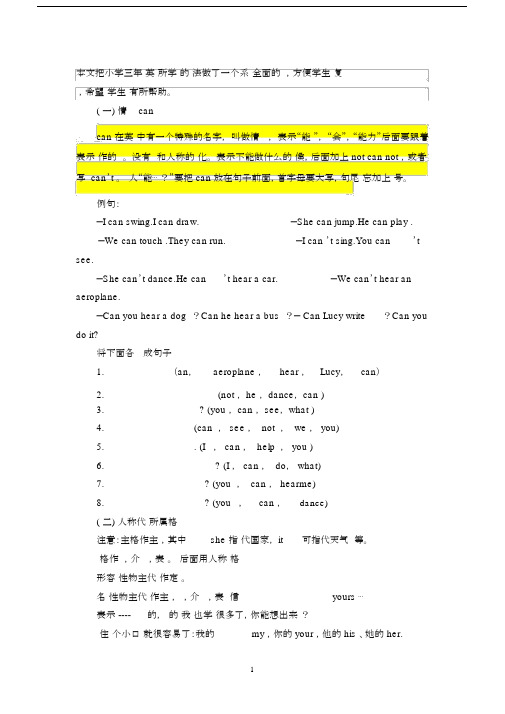
本文把小学三年英所学的法做了一个系全面的,方便学生复,希望学生有所帮助。
( 一) 情 cancan 在英中有一个特殊的名字,叫做情,表示“能”,“会”,“能力”后面要跟着表示作的。
没有和人称的化。
表示不能做什么的候,后面加上 not can not ,或者写 can’t 。
人“能⋯?”要把 can 放在句子前面,首字母要大写,句尾忘加上号。
例句:—I can swing.I can draw.—We can touch .They can run.—She can jump.He can play .—I can ’t sing.You can’tsee.—She can’t dance.He can’t hear a car.—We can’t hear an aeroplane.—Can you hear a dog ?Can he hear a bus ?— Can Lucy write?Can you do it?将下面各成句子1._____________(an,aeroplane ,hear ,Lucy,can)2._____________________(not , he , dance, can )3.__________________? (you , can , see, what )4._________________(can , see , not , we , you)5._________________. (I , can , help , you )6._____________________? (I , can , do, what)7.___________________? (you , can , hearme)8.___________________? (you,can ,dance)( 二) 人称代所属格注意:主格作主,其中she 指代国家, it可指代天气等。
人教版四年级英语下册语法知识点总结

人教版四年级英语下册语法知识点总结四年级下册的英语学习内容主要包含了一些基础的语法知识点。
在本文中,我将对这些知识点进行总结和整理,以帮助学生更好地掌握和理解英语语法。
一、时态1. 现在时态(Present Tense):表示目前正在进行或经常发生的动作。
2. 过去时态(Past Tense):表示过去发生的动作或状态。
3. 将来时态(Future Tense):表示将来要发生的动作或状态。
二、名词(Noun)1. 可数名词(Countable Noun):可单独计数的名词,前面可以加不定冠词"a"或"an"。
2. 不可数名词(Uncountable Noun):不能单独计数的名词,前面通常不加不定冠词。
3. 复数形式:名词变为复数形式的规则及特殊变化。
三、代词(Pronoun)1. 主格代词(Subject Pronoun):代替句子中的主语。
2. 宾格代词(Object Pronoun):代替句子中的宾语。
3. 物主代词(Possessive Pronoun):用来表示所属关系。
四、形容词(Adjective)1. 形容词的基本用法:用来描述名词。
2. 比较级和最高级:形容词的比较级和最高级的构成及用法。
五、副词(Adverb)1. 副词的基本用法:用来修饰动词、形容词、副词等。
2. 比较级和最高级:副词的比较级和最高级的构成及用法。
六、介词(Preposition)1. 介词的基本用法:表示位置、方向、时间、原因等。
2. 常见的介词:常用的介词及其正确用法。
七、连词(Conjunction)1. 表示并列关系的连词:and, but, or等。
2. 表示选择关系的连词:either...or, neither...nor等。
3. 表示原因关系的连词:because, so等。
八、冠词(Article)1. 不定冠词(Indefinite Article):a和an的使用。
四年级英语语法知识点大全

四年级英语语法知识点大全1. 一般现在时:表示现在经常或习惯性发生的动作、存在的状态或普遍真理。
例句:He plays football every Sunday.(他每个星期天都踢足球。
)2. 一般过去时:表示过去发生的动作或存在的状态。
例句:I watched a movie last night.(昨晚我看了一部电影。
)3. 现在进行时:表示现在某个时刻正在发生的动作。
例句:She is eating breakfast now.(她现在正在吃早餐。
)4. 过去进行时:表示过去某个时刻正在进行的动作。
例句:He was studying when I called him.(我给他打电话时,他正在学习。
)5. 现在完成时:表示过去发生并与现在有关的动作或经验。
例句:I have visited Japan twice.(我已经去过日本两次。
)6. 过去完成时:表示过去某个时间或动作之前已经发生或完成。
例句:By the time he arrived, we had already left.(他到达的时候,我们已经离开了。
)7. 一般将来时:表示将来将要发生的动作或存在的状态。
例句:I will go to the zoo tomorrow.(我明天要去动物园。
)8. be动词的变化形式:- am(我)- is(他、她、它)- are(我们、你们、他们)9. 动词的三单形式:在主语为第三人称单数时,动词要加-s或-es。
例句:He loves to play basketball.(他喜欢打篮球。
)10. 动词的现在分词形式:动词+ing。
例句:I am swimming in the pool.(我正在游泳池里游泳。
)11. be动词的过去式变化形式:- was(我、他、她、它)- were(我们、你们、他们)12. 情态动词:- can(能)- could(能、可以)- may(可能)- might(可能)- must(必须)- shall(将要)- should(应该)- will(将要)- would(愿意、将要)13. 几种特殊疑问句的构成形式:- What(什么): What is your name?(你叫什么名字?)- Where(哪里): Where is the park?(公园在哪里?)- When(什么时候): When is your birthday?(你的生日是什么时候?)- Who(谁): Who is your best friend?(谁是你最好的朋友?)- Why(为什么): Why are you late?(你为什么迟到了?)14. 四大句型:- 肯定句:主语+谓语动词+宾语。
小学四年级英语语法知识汇总

小学四年级英语语法知识汇总-CAL-FENGHAI.-(YICAI)-Company One1小学四年级英语语法知识汇总第一章名词(Noun)名词的概念在生活中,我们会接触到各种各样的人和事物,用来表示这些人或事物名称的词就是名词。
一、名词的数名词的数指名词的单数和复数形式。
可数名词表示“一个”时用单数,“两个以上”时用复数;不可数名词表示量时,通常用“数词+单位+of+物质名词”的形式,如 a piece of bread (一片面包),变为复数时,只须将单位名词变为复数,如:two pieces of bread(两片面包)。
*名词复数的构成法则1. 一般情况下在词尾加 s. 词尾读音shop --- shops (商店) 在清辅音后读 [ s ]bag --- bags (书包) 在浊辅音后读 [ z ]window --- windows (窗户) 在元音后读 [ z ]2. 以 s, x, sh, ch 结尾的单词在词尾加es。
class --- classes (班级) 词尾读音[ iz ]box --- boxes (盒子)match --- matches (比赛)brush --- brushes (刷子)3. 以“辅音字母+y” 结尾的词,变y为 i 加es.story --- stories (故事) 词尾读音[ iz ]4. 以“元音字母+y” 结尾的词,在词尾直接加 skey --- keys 词尾读音[ z ]monkey --- monkeys5.以“o” 结尾的名词,复数一般在词尾加“s”, 但个别加“es”tomato --- tomatoes (西红柿) 词尾读音[ z ]potato --- potatoes (土豆)zoo --- zoos (动物园)photo --- photos (照片)*(以“o”结尾,复数加“es”)口诀:黑人(Negro)英雄(hero),左手拿着西红柿(tomato),右手拿着破土豆(potato),头顶一个大芒果(mango)。
四年级英语语法知识点总结(5篇)
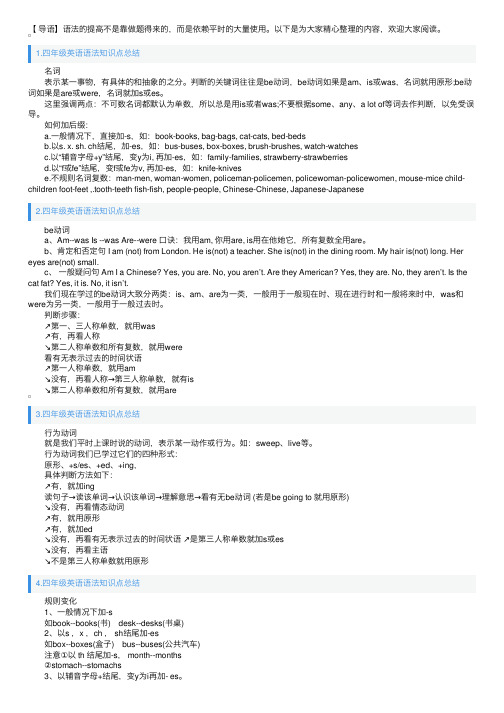
【导语】语法的提⾼不是靠做题得来的,⽽是依赖平时的⼤量使⽤。
以下是为⼤家精⼼整理的内容,欢迎⼤家阅读。
1.四年级英语语法知识点总结 名词 表⽰某⼀事物,有具体的和抽象的之分。
判断的关键词往往是be动词,be动词如果是am、is或was,名词就⽤原形;be动词如果是are或were,名词就加s或es。
这⾥强调两点:不可数名词都默认为单数,所以总是⽤is或者was;不要根据some、any、a lot of等词去作判断,以免受误导。
如何加后缀: a.⼀般情况下,直接加-s,如:book-books, bag-bags, cat-cats, bed-beds b.以s. x. sh. ch结尾,加-es,如:bus-buses, box-boxes, brush-brushes, watch-watches c.以“辅⾳字母+y”结尾,变y为i, 再加-es,如:family-families, strawberry-strawberries d.以“f或fe”结尾,变f或fe为v, 再加-es,如:knife-knives e.不规则名词复数:man-men, woman-women, policeman-policemen, policewoman-policewomen, mouse-mice child-children foot-feet ,.tooth-teeth fish-fish, people-people, Chinese-Chinese, Japanese-Japanese2.四年级英语语法知识点总结 be动词 a、Am--was Is --was Are--were ⼝诀:我⽤am, 你⽤are, is⽤在他她它,所有复数全⽤are。
b、肯定和否定句 I am (not) from London. He is(not) a teacher. She is(not) in the dining room. My hair is(not) long. Her eyes are(not) small. c、⼀般疑问句 Am I a Chinese? Yes, you are. No, you aren’t. Are they American? Yes, they are. No, they aren’t. Is the cat fat? Yes, it is. No, it isn’t. 我们现在学过的be动词⼤致分两类:is、am、are为⼀类,⼀般⽤于⼀般现在时、现在进⾏时和⼀般将来时中,was和were为另⼀类,⼀般⽤于⼀般过去时。
人教版小学四年级英语语法总结

一、名词复数规则1. 一般情况,直接加-s,如:book-books, bag-bags, cat-cats2. 以s. x. sh. ch结尾,加-es,如:bus-buses, box-boxes, watch-watches(手表)3. 以“辅音字母+y”结尾,变y为i, 再加-es,如:family-families, strawberry-strawberries 但boy-boys4. 以“f或fe”结尾,变f或fe为v, 再加-es,如:knife-knives leaf-leaves5. 以o结尾有生命的加es 无生命的加s,如:potato-potatoes tomatoes photo-photos piano-pianos不规则名词的复数:man-men, woman-women, policeman-policemen, policewoman-policewomen, child-children, foot-feet, tooth-teeth, fish-fish, people-people, Chinese-Chinese, goose-geese不可数名词没有复数形式:paper, juice, water, milk, rice, tea在具体句子中我们应该把不可数名词当成单数看待二、一般现在时一般现在时的功能1.表示事物或人物的特征、状态。
如:The sky is blue.天空是蓝色的。
2.表示经常性或习惯性的动作。
如:I get up at six every day.我每天六点起床。
3.表示客观现实。
如:The earth goes around the sun.地球绕着太阳转。
一般现在时的标志词:often, usually, sometimes, every等一般现在时的构成主语+动词原形。
如:We study English. 我们学习英语。
当主语为第三人称单数(he, she, it,my father等)时主语(三单)+动词的三单形式(要在动词后加"-s"或"-es")如:Mary likes Chinese.玛丽喜欢汉语。
人教版四年级英语上册重点知识点
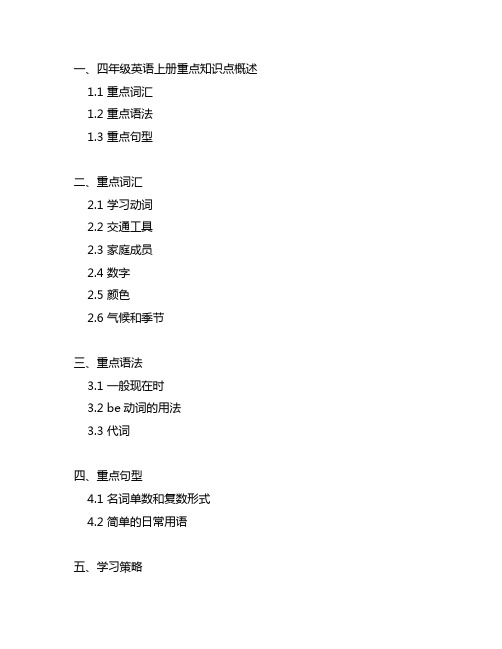
一、四年级英语上册重点知识点概述1.1 重点词汇1.2 重点语法1.3 重点句型二、重点词汇2.1 学习动词2.2 交通工具2.3 家庭成员2.4 数字2.5 颜色2.6 气候和季节三、重点语法3.1 一般现在时3.2 be动词的用法3.3 代词四、重点句型4.1 名词单数和复数形式4.2 简单的日常用语五、学习策略5.1 词汇记忆方法5.2 语法学习技巧5.3 句型应用技巧六、实际应用6.1 在日常生活中的运用6.2 在阅读和写作中的应用6.3 在口语交流中的实际使用七、英语教学方法7.1 游戏教学法7.2 情景教学法7.3 多媒体教学法八、结语在第一部分,我们来概述四年级英语上册的重点知识点。
本学期的重点知识主要集中在词汇、语法、句型等方面。
下面我们将逐一进行讨论。
2.1 重点词汇本学期的重点词汇包括学习动词(如play, study, read等)、交通工具(如car, bus, bike等)、家庭成员(如father, mother,brother等)、数字(如one, two, three等)、颜色(如red, blue, yellow等)以及气候和季节相关词汇(如hot, cold, summer, winter 等)。
这些词汇是孩子们日常生活中经常使用到的,掌握这些词汇将有助于他们在英语学习中更加游刃有余。
2.2 重点语法本学期主要学习一般现在时、be动词的用法以及代词。
一般现在时是英语中最基本的时态之一,掌握了这一时态,孩子们就能够描述自己和他人的日常活动,表达习惯性动作以及客观事实。
be动词也是英语中必不可少的一部分,它有时态和人称的变化,熟练掌握be动词的用法,将为以后的学习打下坚实基础。
在本学期还将学习一些基本的代词,如I, you, he, she, it等,这些代词在交流中起到十分重要的作用,能够帮助孩子们简便地表达自己的意思。
2.3 重点句型在本学期,我们要重点学习名词的单数和复数形式、以及一些简单的日常用语。
- 1、下载文档前请自行甄别文档内容的完整性,平台不提供额外的编辑、内容补充、找答案等附加服务。
- 2、"仅部分预览"的文档,不可在线预览部分如存在完整性等问题,可反馈申请退款(可完整预览的文档不适用该条件!)。
- 3、如文档侵犯您的权益,请联系客服反馈,我们会尽快为您处理(人工客服工作时间:9:00-18:30)。
人教版小学四年级英语语法总结LEKIBM standardization office【IBM5AB- LEKIBMK08- LEKIBM2C】本文把小学三年级英语所学习的语法做了一个系统全面的总结,方便学生们复习,希望对学生们有所帮助。
(一)情态动词cancan 在英语中有一个特殊的名字,叫做情态动词,表示“能够”,“会”,“能力”后面要跟着表示动作的动词。
没有时态和人称的变化。
表示不能做什么的时候,后面加上 not为can not,或者缩写为can’t。
问别人“能…吗”要把can 放在句子前面,首字母要大写,句尾别忘加上问号。
例句:—I can can draw.—She can can play .—We can touch .They can run.—I can’t can’t see.—She can’t can’t hear a car.—We can’t hear an aeroplane.—Can you hear a dogCan he hear a bus—Can Lucy writeCan you do it将下面各组词组成句子(an,aeroplane,hear,Lucy,can)2. _____________________(not,he ,dance,can )(you,can ,see,what )(can ,see ,not ,we ,you). (I ,can ,help ,you )(I,can ,do,what)(you ,can ,hear me)(you ,can ,dance)(二)人称代词所属格注意:主格作主语,其中she指带代国家,it可指代天气时间等。
宾格作宾语,介词宾语,表语。
动词后面用人称宾格形容词性物主代词作定语。
名词性物主代词作主语,宾语,介词宾语,表语书信yours…表示 ---- 的,这样的词我们也学习很多了,你能想出来吗?记住这个小口诀就很容易了:我的 my ,你的your,他的 his、她的her. 出下列人称代词的所属格形式I________you_________he______________She_________it____________we_____________You_________they_________二.用合适的人称代词填空(1) This is Ben. This is _______bicycle.(2) I am Kitty. ______ bag is blue(3) She’s Alice.That’s _____ umbrella.(4) You are Mr Li. ______ car is black.(5) Is this ______ hat?Yes,it’s my hat.(6) That’s my ’s _____ coat.(7) Where’s ______ scarf?Here you are.(8) He’s Mr Wang. _____ gloves are new.三.翻译下列词组1. 你的名字 _____________2.我们班___________3. 他的小弟弟____________4.我祖母___________5. 它的尾巴 ______________6.我的鞋____________7. 她的围巾________________8.我的衬衫_________9. 他们的老师______________10.玛丽的雨伞_________四.用下列单词组句(my ,is,name , Tom)(is, miss ,Gao,, our,friend)(is what ,your number ,telephone)(mother , your ,a teacher , is)(who’s , cap , it , is)答案:一. I(my) you (your)he(his)she(her)it(its)We (our) you (your)they (their)三. name class 3. his little brother grandmothertail shoes scarf shirt teacher10. Mary’s umbrella四. name is Tom. Gao is our friend’s your telephone number? your mother a teacher?’s cap is it?(三)介词、连词和感叹词1.介词:介词是一种虚词,不能单独使用,必须在介词后面加上个名词或代词使用,作句子成份。
介词后面的名词(或相当于名词的其它词)叫做介词的宾语。
介词和介词宾语合称为介词短语。
介词短语在句中可作壮语、定语或表语。
介词如: in 在…里面on在…上面under在…下面等。
in the classroom in the tree in the hallon the road on the desk on the floorunder the table under the bed under the chair2.连词:连词是用来连接词与词、短语与短语、句子与句子等的词叫连词。
连词是一种虚词,在句子中不能单独作句子成分。
连词分两类:一类叫等立连词,另一类叫从属连词。
(1). 等立连词是用来连接同等的词、词组和分句的。
等立连词有许多我们现在只学到了and和but,其他的以后学到再介绍。
如:A and B ; blue and white ;an apple and a banana;a car and a bus;Lucy and Ben ; Ben and Kitty ;This is a lorry and that’s a drill.I like dolls and you like robots.(2). 从属连词是用来引起从句的、从属连词又分为1) 引起名词性从句的连接词,如:if ,that 等。
2)引起壮语从句的连接词,如:when , after ,befare等。
以后会逐渐学到再介绍。
3.感叹词: 表示说话人的某种感情(惊讶,高兴,痛苦等)的词叫感叹词。
感叹词后常用感叹号。
常用的感叹词有:oh(表示惊奇或痛苦),ah(表示惊奇或满意),hello(常被用来打招呼相当于汉语的“喂!”),well(表示惊讶,无奈)如: you Mary?练习:翻译下列词组1.在桌子上面2.在树下面3.在椅子上面4.在盒子里面5.在黑板上6.在书里7.在脸上8.在公共汽车上9.一只猫和一只狗.10.又小又胖答案:1. on the desk 2. under the tree 3. on the chair 4. in the box 5. on the blackboard 6. in the book7. on the face8. on the bus 9. a cat and a dog 10. small and fat(四)单数句和复数句:(五)口诀:单数句子变,变化规则要记住。
名词代词要变化,am, is要变are。
(六)this, that变成啥,these, those来替它。
he, she, it要变啥,全部变they不用怕。
(七)I要变we莫落下,名词后面把s/es加。
名前冠词去掉它,其余成分原样加。
(八)具体注意下面的六要素:(九)1.单数主格人称代词要变成相应的复数主格人称代词,即I→we;you→you; she, he,it→they。
如:She is a girl.→They are girls.(十)2. am, is要变为are。
如:I‘m a student. →We are students.(十一)3.不定冠词a, an要去掉。
如:He is a boy. →They are boys.(十二)4.普通单数名词要变为复数形式。
如:It is a cat. →Theyare cats.(十三)5.指示代词this, that要变为these, those。
如: This is a book.→These are books.(十四)6. man, woman作定语修饰可数名词时,要在”数”上与被修饰名词保持一致。
但其他名词修饰名词表示”性质”时,不作变化。
如:(十五)He is a man doctor.→They are men doctors.(十六)(十七)This is an apple tree.→They are apple trees.(十八)(十九)单复数相互转换,每空一词(含缩写)。
(二十) 1. The woman is a nurse.(改为复数句)(二十一)The _________ _________ _________.(二十二)(二十三) 2. There are some old cars.(改为单数句)(二十四)There _______ _______ old _______.(二十五)(二十六) 3. He has a new book.(改为复数句)(二十七)______ ______ new _______.(二十八)(二十九) 4. Are these your chicks ((三十)改为单数句)(三十一)_____ _______ your _______(三十二)(三十三)(三十四) 5. Is there a sheep in the playground((三十五)改为复数句)(三十六)____ there ____ ____ in the playground?(三十七)(三十八)(五)一般疑问句及特殊疑问句(三十九)句子基本是:简单陈述句,由简单陈述句转变成肯定句,否定句,疑问句。
疑问句是用来提出问题。
英语中有四种疑问句: 一般疑问句、特殊疑问句、选择疑问句和反意疑问句。
我们现在已经接触到了前两种疑问句。
后两种疑问句以后我们还会学到.(四十)一.一般疑问句:(四十一)英语中要用 yes和no 来回答的疑问句叫一般疑问句。
如: (四十二)1)Is it hot(四十三)Yes, it is .\No,it isn’t.—— be动词引导(四十四)(四十五)2)Is it a car(四十六)Yes, it is .\No,it isn’t .—— be动词引导(四十七)(四十八)3)Is this your ruler(四十九)Yes, it is .\No,it isn’t .—— be动词引导(五十)(五十一)4)Do you like bananas —(五十二)—含实义动词(五十三)(五十四)Yes, I like bananas. \ No,I don’t like bananas.(五十五)(五十六)5)Can Ming hear a drill —(五十七)—含情态动词(五十八)(五十九)Yes , Ming can hear a drill.\No,Ming can’t hear a drill.(六十)(六十一)二.陈述句(肯定句,否定句,一般疑问句)的转变规律:(六十二)1.肯定句:2.否定句:3. 一般疑问句及肯否定回答(六十三)1) 主语+be动词+….1) 主语+be动词+not+….1)be动词+主语+…(六十四)(六十五)Yes,主语+be动词./No,主语+be动词+not.(六十六)I am a teacher.I amnot a you a teacher?(六十七)--Yes, I am./ No, I am not.(六十八)My mother is thin.My mother is not /isn’t your mother thin?(六十九)--Yes, she is./ No,she isn’t.(七十)They areinsects.They are not/aren’t they insects?(七十一)--Yes. they are./ No,they aren’t.(七十二)2) 主语+情态动词can+… 2) 主语+情态动词can+ n ot+….2)情态动词can+主语+…(七十三)(七十四)Yes,主语+情态动词can/(七十五)No,主语+情态动词can+ not(七十六)He can jump.He cannot/can’ he jump?(七十七)--Yes,he can./ No,he can’t.(七十八)3)助动词do/does+主语+…. 动词原形+….动词原形?(七十九)Yes,主语+助动词do/does.(八十)No,主语+助动词do/does+not.(八十一)He likes to eat apples.He doesn’t like to eat apples. Does he like to eat apples?(八十二)Yes,he does./ No,he doesn’t.二. 祈使句:表示请求、命令、建议或劝告等的句子叫祈使句,主语you 常省略。
